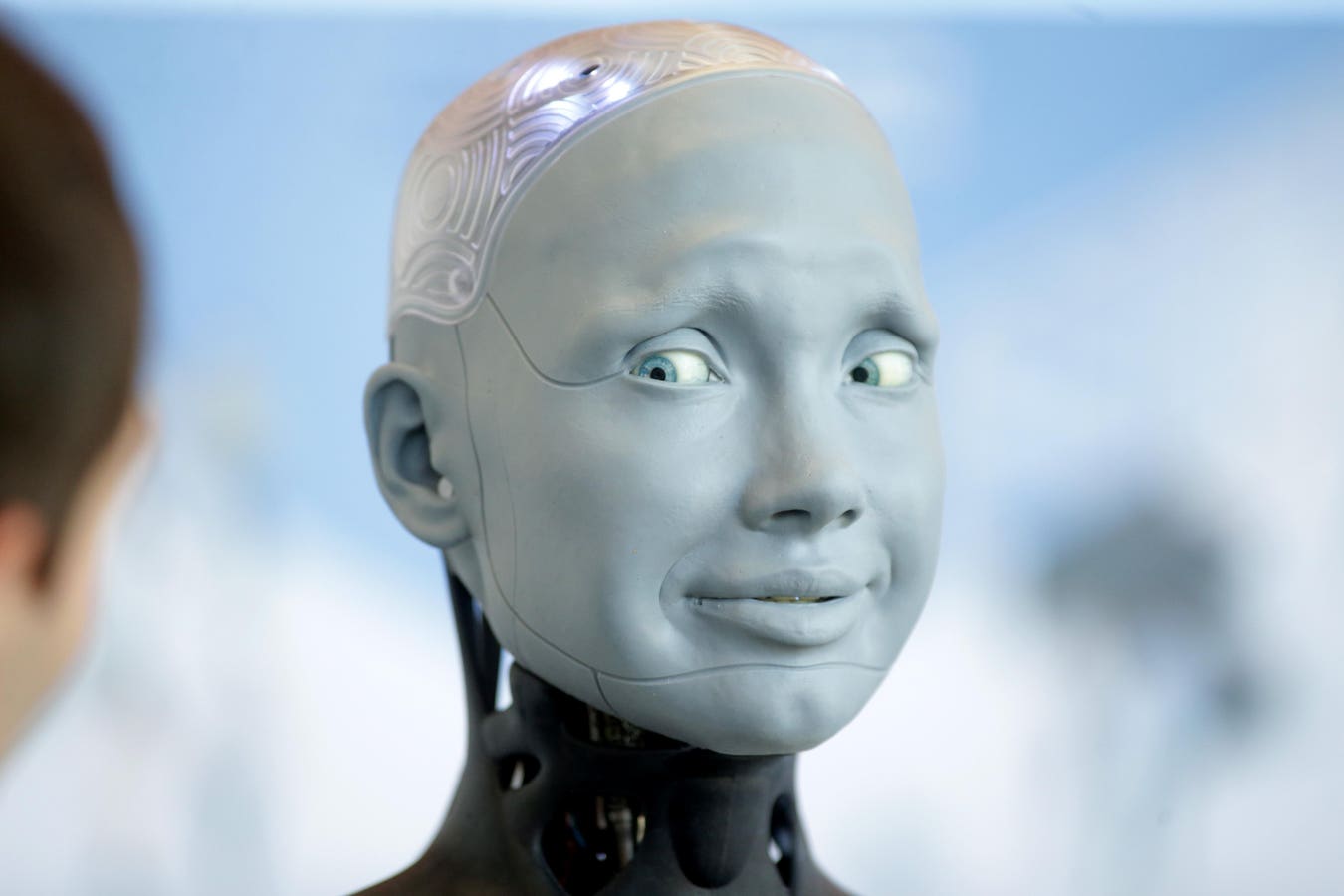Human shaped robot Ameca of British manufacturer Engineered Arts potential for empowering humanity. … [+]
There’s a chorus of “thought leaders” arguing that AI will not replace managers. The Harvard Business Review is leading the charge with a suite of articles that insist that AI will not replace human decision-makers and that AI “will enable knowledge workers to concentrate on value-adding activities where human expertise is indispensable” (Senz, 2023). De Cremer and Kasparov (2021) argue that “AI should augment human intelligence, not replace it.” Martela and Luoma (2021) flat out declare that “AI will never replace managers” because humans are better at “reframing” problems than machines – at least for now. Other papers in HBR suggest that too much focus on AI can actually cause “more problems than it’s solving” (Acar, 2024), and Shrier (2023) describes the jobs most and least affected by AI with the simple title “is your job AI resilient?” Finally, Lakhani (2023) argues that “AI won’t replace humans – but humans with AI will replace humans without AI. The general conclusion is that humans and their uniqueness need not worry too much about losing their jobs to algorithms, and that AI will remain assistants rather than partners and certainly not bosses – which is like deciding that an employee will remain in his or her job forever no matter how well he or she performs.
Thought Leaders Make Mistakes
What if the thought leaders are wrong? There’s no guarantee that they’re right, is there? There have been many cases in technology history where pundits got it wrong. Thought leaders and pundits missed the impact social media would have on communications, activism and commerce. They failed to see the collapse of Internet business models. They missed the decline of the EV market we’re experiencing right now, and let’s not forget the Metaverse, Google Glass, self-driving cars, NFTs and the adoption of VR and AR.
Here are some especially amusing ones over the years that Gemini told me about:
“The internet will collapse” (1995): Bob Metcalfe, inventor of Ethernet, famously declared the internet would implode. Thankfully, he later ate his words.
“Nobody needs a computer in their home” (1977): Ken Olsen, founder of Digital Equipment Corp (DEC), couldn’t see the potential for personal computers. DEC is a footnote in history now
“Mobile phones will absolutely never replace wired phones” (1998): Marty Cooper, who invented the mobile phone, ironically underestimated its disruptive potential.
“Television won’t last. People will soon get tired of staring at a box every night” (1946): Darryl Zanuck, head of 20th Century Fox, completely missed the power of television as a medium.
“Video games will not change the way we interact with computers and will not affect the computer hobbyist market” (1975): Hobbyists’ magazine Popular Electronics completely whiffed on the future dominance of video games.
“Nuclear-powered vacuum cleaners will be in every home by 1995” (1955): Alex Lewyt, a vacuum cleaner company CEO, made this outlandish (and frankly dangerous) prediction.”
Christensen’s The Innovator’s Dilemma (1997) is a tour deforce of how reality can escape companies that should know better.
So it’s possible that the “AI-will-not-take-your-job” crowd is very wrong. But how wrong could they be? Far be it from me to argue with HBR’s general take on AI’s role in business problem-solving and decision-making, there’s another way to look at the power of AI and the impact it will have on the knowledge professions: AI will displace many more knowledge workers than anyone believes is possible, which is easily as possible as AI-will-not-take-your-job assurances.
Let’s Assume They’re Wrong
So what if the thought leaders are wrong? The Harvard Business Review is full of reassurance. The journal’s insistence that AI will not replace managers is dangerously reassuring. What if AI is destined to obliterate knowledge workers and thoroughly and utterly replace them in even so-called high-value decision-making? Let’s remember that “AI” (machine learning and especially generative AI) is very new. We’re at step one of a ten step journey where the 10th step is always moving. No one knows how this will end, except that it won’t – which is why judgements about which jobs are resilient and which aren’t today are by definition misleading. How could thought leaders possibly know the power of AI ten or twenty years from now or what professions – many of which have yet to be invented – will grow, shrink or disappear altogether?
Ideally, we base short-term predictions on defined processes and the power of AI today with just a little extrapolation about future power. This is safe territory for pundits. Opining about anything based upon general principles — like humans have unique problem-solving capabilities that AI can never replace — is wrong. We just don’t know if such principles will persist.
Domains & Timing
It’s impossible to talk about the role that AI will play without segmentation. We need a matrix of domains and timelines. Some domains – like medical imaging – will yield to machine learning and generative AI faster than others. Which are which? The nature of problems and work must also be specified. Well-bounded domains – regardless of their complexity – are all fair game.
Gemini tells us that “generative AI … excels in tasks that involve creating new data, often creative in nature. Here are some problem domains where generative AI shines: image and video generation, content creation, data augmentation and drug discovery.”
I recently made the argument that higher education and the staff that enables it are all in the crosshairs of AI. These “predictions” are based upon the tasks that professors and students perform to “learn” – the domain of higher education explained around processes that are – today – particularly amenable to AI tools. Higher education is not the only vulnerable domain. Domains with similar well-bounded processes are also targets.
Stop the Reassurance
It’s time to stop reassuring ourselves about what AI will not replace. If the technology trends are any indication of impact, machine learning and generative AI are far more likely to replace than preserve knowledge workers. It will take some time for this prediction to be validated or rejected, but arguments that AI has limits and that humans are uniquely qualified to make certain decisions are wrong. While it’s impossible to know what happens in ten years, we can be sure that machine learning and generative AI will replace a growing number of knowledge workers in the next three to five years. Probably more than we imagine.



